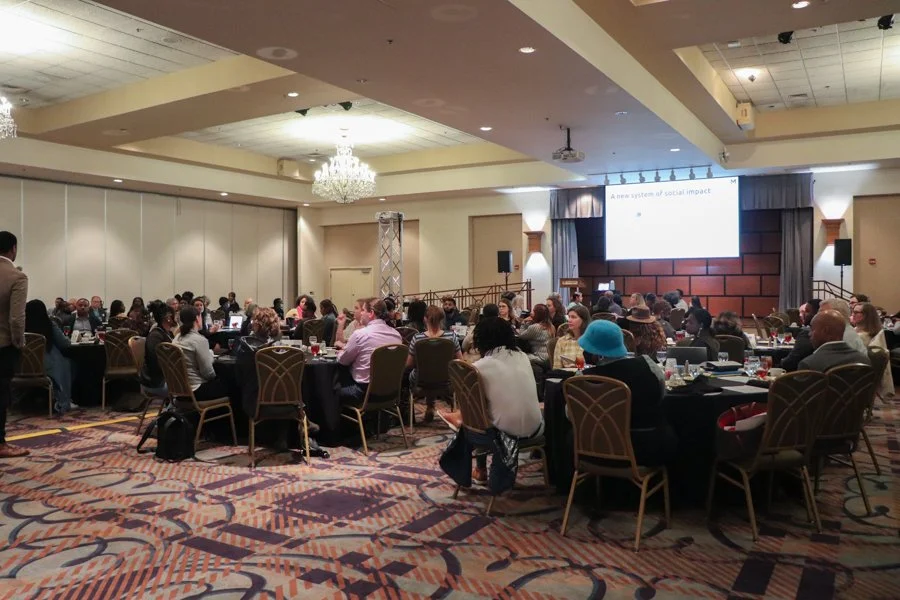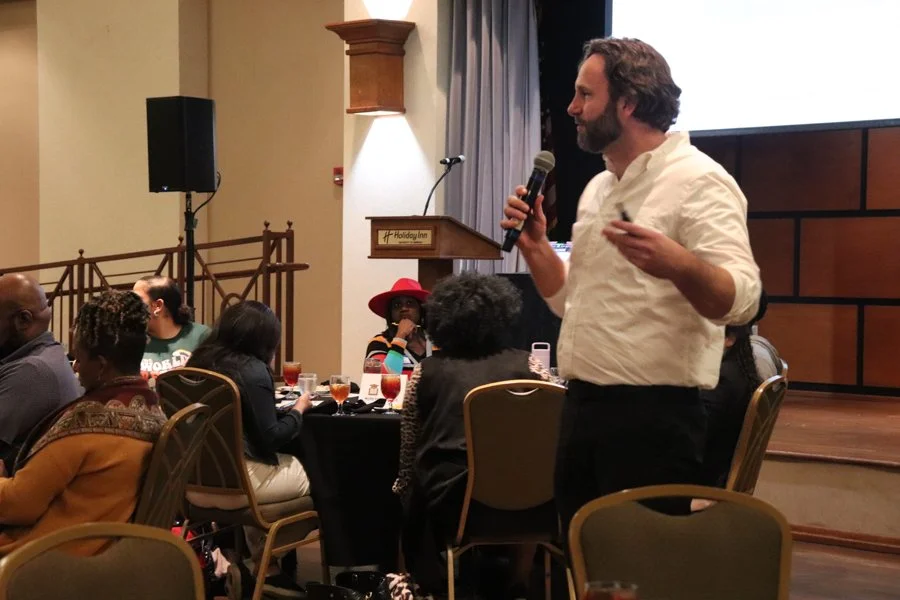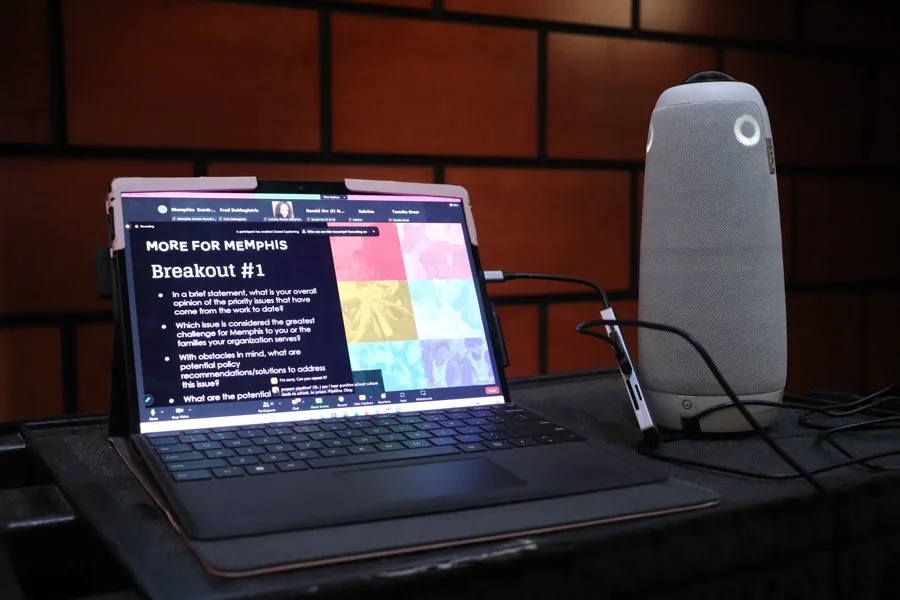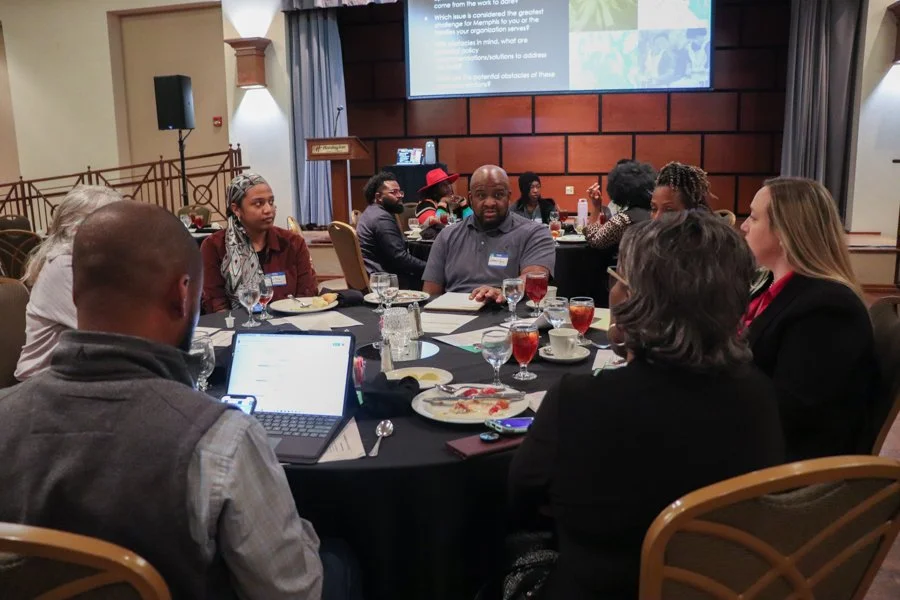Making New Connections in the More For Memphis Partnership
On Wednesday, February 15th, the More For Memphis partnership gathered at the University of Memphis Holiday Inn to learn about opportunities for government support and to share feedback on current focus area strategies. One hundred people showed up in person, and 25 attended virtually.
Participants exchanged introductions while enjoying the provided dinner, and discussed how each of their organizations strive to create a more equitable Memphis through their work. Afterward, Seeding Success Chief Strategy and Impact Officer Jamilica Burke led a moment of silence for those who were a part of More For Memphis who have been lost to violence since the start of the work: Ian Adams, Autura Eason-Williams, Mia Madison, Troykia Mathis, and Eduardo Oceja. This was a solemn reminder of the importance of building equity, supporting mental and emotional health, and re-imagining safety in the city; these issues impact residents every day.
Before the start of strategy discussion, Burke recapped the purpose of More For Memphis: to transform Memphis, through dismantling unjust systems, into an inclusive city with a deep sense of community, liberation, and access to wealth-building systems. Participants reviewed the updated timeline for drafting and presenting the plan in pursuit of local, state, federal, and private funding. Then, S2 CEO Mark Sturgis took the floor and pointed to May 2023 as a significant planning goalpost: if anchor collaboratives (ACs) and partners complete the plan by then, $50M from Blue Meridian’s long-term, flexible funding could be aligned to matching local capital to begin implementation. That means $100M to start!
Additionally, Seeding Success, alongside Memphis-Shelby County Schools, Millington Schools, Frayser Community Schools, Memphis Business Academy, Communities in Schools Memphis, and the University of Memphis, applied for and received a federal Full-Service Community Schools grant of $30M over the next five years to expand full-service community schools infrastructure and services for about 3,400 families. While other grant applications are still pending, this proves that the support More For Memphis needs is within reach if we can prove the efficacy of our solutions.
With these updates in mind, groups at each table were then asked to reflect on their particular focus area–Economic Development, Culture, Justice & Safety, Education & Youth, Community Development, or Health & Wellness–using problem statements developed by the anchor collaboratives and their S2 social policy consultants (SPCs). Haley Simmons and Matt McCaffrey, Chief Public Policy Officer and Director of Public Policy & Analysis for Seeding Success respectively, spoke briefly on the joint resolution unanimously passed by the Shelby County Commission, M-SCS Board, and Memphis City Council in 2022 which laid out the local government’s involvement in the project. Then, participants were given two sets of questions to prompt productive dialogue on systemic issues, untapped resources, and policy solutions.
After the allotted time for these conversations, representatives from the tables shared their findings with the wider group. At a table for Justice & Safety and Education & Youth combined, one participant shared how excited she was to see that some solutions both ACs talked about–such as increasing the amount of counselors in schools–overlapped. “Making sure we’re in a space where we can actually share is going to be so beneficial to us as we try to figure out what exact policies we want.”
“Who’s sitting down and helping these students look for the resources them and their families need as far as housing [and] social-emotional learning?”
Another table pointed to the close relationships between food insecurity, access to healthcare, and chronic diseases because having access to care and healthy foods as a child makes a huge difference in one’s likelihood of developing chronic disease later in life. One Culture table echoed the need for cross-sector work because equitable access to the arts could solve certain issues other ACs are seeking to solve and vice versa.
Finally, a young participant from an Education & Youth table spoke on inadequate pay as the cause of teacher and counselor shortages, which could impact college readiness for students. “Who’s sitting down and helping these students look for the resources them and their families need as far as housing [and] social-emotional learning? Who is going to sit down and talk with them to help them increase their attendance and all this stuff if all they’re focusing on is on behavior and test scores? And the funding that we’re asking so vigorously for isn’t being displayed across zipcodes at all.” This contribution was met with snaps and applause from the room.
The meeting wrapped up just past six o’clock, and an Education & Youth Visioning Session followed right after. We are so grateful to all who showed up to contribute their valuable knowledge toward building an effective strategy for a better city.
Looking to get involved? Complete the Workgroup Interest Form at moreformemphis.org.




